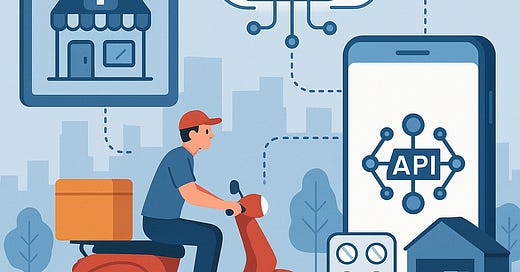How APIs and IoT Are Transforming Last-Mile Pharmaceutical Logistics in Indian Cities
APIs & IoT Power Smarter Pharma Delivery in Cities
In the rapidly evolving landscape of healthcare logistics, technology is playing a critical role in bridging gaps between suppliers and patients—especially in urban centers like Thane. With rising demand for temperature-sensitive, time-critical deliveries, particularly for essential medicines, the integration of APIs and IoT in last-mile delivery is not just an innovation—it's a necessity.
Many logistics companies, including those offering the best medicine courier service in Thane, are turning to tech infrastructure to optimize delivery reliability, monitor drug safety, and meet the expectations of both regulators and patients.
In this blog, we’ll explore how these technologies are reshaping pharma logistics, what businesses should know when adopting them, and where the next wave of transformation may occur.
APIs: The Backbone of Real-Time Integration
In the past, courier and logistics systems operated in silos. Today, APIs (Application Programming Interfaces) enable real-time integration between pharmacy management systems, delivery platforms, inventory software, and compliance modules.
Key advantages of API integration in pharma logistics:
Real-time tracking: Customers and backend systems get instant updates on location, estimated time of arrival (ETA), and delivery conditions.
Order automation: Prescriptions can be automatically routed to delivery services once verified by pharmacy platforms.
Regulatory alignment: APIs can cross-reference shipping data against compliance checklists, such as banned substances lists for international shipments.
For example, a user placing an online order for insulin from Thane can see real-time tracking thanks to a well-integrated API system. When this is supported by a provider like the best medicine courier service in Thane, it adds a layer of operational trust and transparency, which is essential in healthcare.
IoT and Cold Chain Monitoring
Medicines, especially injectables, vaccines, and biologics, require specific storage temperatures. The Internet of Things (IoT) allows logistics providers to embed smart sensors in shipment containers that track variables like:
Temperature
Humidity
Shock and vibration
Light exposure (to detect tampering)
These sensors send live data to a central dashboard via mobile networks, allowing logistics teams to intervene if a package risks breaching its thermal threshold. In a city like Thane, with variable climate and traffic conditions, this is vital.
Use case: A courier company delivering cardiac medicines across Thane suburbs might use IoT-enabled containers to ensure each delivery remains between 2–8°C. Alerts can be triggered the moment the internal temperature spikes due to traffic delay or mechanical failure, allowing corrective action.
This level of control has become a differentiator for service providers positioning themselves as the best medicine courier service in Thane and other urban areas with dense populations and logistical challenges.
Data Analytics for Delivery Optimization
One of the most transformative tech tools in pharma logistics is data analytics. By collecting and analyzing delivery performance data, companies can make more informed decisions and improve:
Route optimization
Resource allocation (fleet usage, staff deployment)
Demand forecasting for different types of medicines
Practical example: A courier company might analyze delivery logs from the past six months to identify which neighborhoods in Thane see more frequent medical shipments. This enables the creation of fixed routes for recurring orders (e.g., dialysis medications), reducing delivery times and improving fuel efficiency.
Advanced analytics also help in managing service SLAs (Service Level Agreements) with hospitals, clinics, and e-pharmacies—especially important for businesses that want to maintain a premium positioning in the market.
Compliance Automation and Blockchain for Traceability
With regulations around pharmaceutical transport becoming stricter, especially for cross-border shipments, compliance automation is no longer optional. Platforms can now use smart contract logic and blockchain-based ledgers to:
Validate source and authenticity of medicines
Record temperature logs during transit
Provide immutable audit trails for authorities
This is especially useful for logistics partners handling sensitive medicines shipped from Thane to countries like the UAE, UK, or Australia.
For instance, a service that claims to be the best medicine courier service in Thane would benefit from using blockchain-backed systems to:
Authenticate government-approved prescriptions
Log approvals and handovers across every checkpoint
Provide regulatory bodies with tamper-proof shipping records
This increases trust and minimizes the risk of legal complications for both sender and receiver.
Conclusion:
In the medical courier space, especially in busy urban hubs like Thane, technical reliability has become just as important as speed. From smart APIs that enable real-time visibility to IoT sensors safeguarding cold-chain compliance, the future of pharma logistics is digital.
For tech-savvy businesses, integrating these technologies means more than operational efficiency—it’s about delivering trust, safety, and long-term client satisfaction. As expectations rise, those who embrace innovation will not only serve better but also lead the market.
And for those evaluating logistics partners, working with the best medicine courier service in Thane means selecting a provider that’s not just fast—but also technically capable of handling the complexities of modern pharmaceutical delivery.



